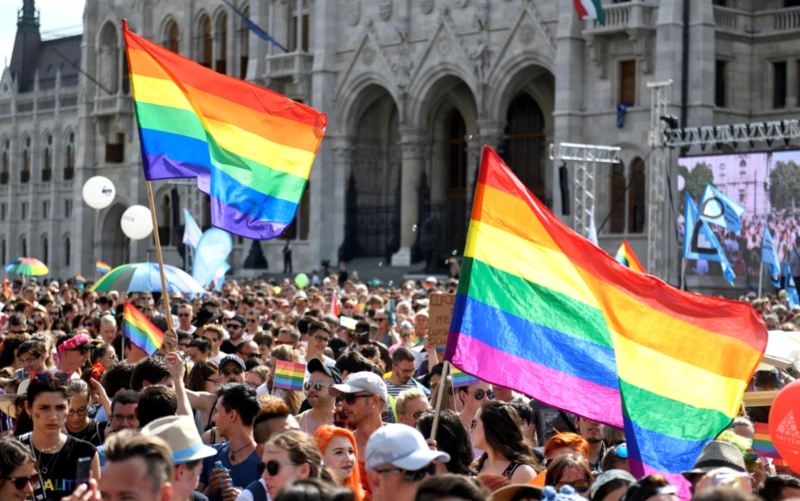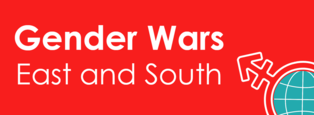Homophobia from on High – Governmental Hostility towards LGBT People in Czechia and Hungary

People take part in the annual Pride festival in Budapest, Hungary on July 6, 2019. (Image credit: Reuters)
At first sight, LGBT+ communities in both Czechia and Hungary ought to be optimistic. Public support for the extension and expansion of tolerance and legal rights to LGBT+ people in both countries has markedly improved in the last decade. Polling in Hungary in 2021 found that 59% of respondents supported equal marriage and 66% backed discussion of LGBT+ topics in schools (Háttér Society, 2021). In 2010, only 45% of Hungarians agreed that gay people should have the right to live freely (Lipka, 2013). In Czechia, public backing for equal marriage reached 67% in 2019, up from 49% in 2015 and 38% in 2008 respectively (Jsme fér, 2020). The direction of travel seems clear. Puzzlingly, however, both countries’ governments swim against rather than with the tide of increasing public solidarity with LGBT+ people. Viktor Orbán’s Fidesz government in Hungary has, amongst other things, legislated to force bookstores to wrap LGBT+ themed works in plastic packaging as well as banned the depiction of LGBT+ content in educational materials in the name of ‘child protection’. In response, 15 EU member states and the European Parliament have launched legal proceedings against Hungary. In Czechia, legislative attempts to secure changes to the Civil Code to bring about same sex marriage are hindered by inertia and a lack of political will from above, with marriage equality appearing as remote a prospect as ever. My research explored the how and why of such displays of political homophobia between 2017 to present in a bid to better understand an embrace of bigotry that seemingly defies all political and electoral logic.
Political homophobia as an instrument of control
My research showed that Fidesz’s embrace of political homophobia stems from two key strategic motivations. Firstly, it is instrumentalised as a tool with which to clearly contrast ‘true’, conservative and Christian Hungarian identity with an ‘alien’ EU backed, liberal and progressive ‘agenda’ of LGBT+ tolerance and rights. Fidesz uses historical memory to present a narrative of siege by hostile forces that taps into past national traumas of foreign occupation and conquest such as the failed 1848 and 1956 revolutions. Fidesz, with the help of a coopted and pliant media, exploits such sentiments to present itself as the sole patriotic defender of Hungary’s hard won independence and gatekeep definitions of ‘Hungarianness’. To be anti LGBT+ is thus to be pro Hungary.
Control over this narrative subsequently allows Fidesz to benefit from a second advantage – that of dividing and discrediting the political opposition. Any embrace of liberal, pro EU values can be labelled as unpatriotic and a threat to Hungary’s very survival. Somewhat ironically, Fidesz has little interest in actually ‘solving’ the ‘problem’ it presents to voters – it knows full well that it is better served by allowing the constructed ‘threat’ to fester and be continuously exploited for political gain. Political homophobia thus becomes ‘baked in’ to wider Hungarian politics and an integral foundational stone upon which the entire contemporary Fidesz project is based.
The emergence in 2018 of a party to Fidesz’s right, Mi Hazánk Mozgalom, (‘Our Homeland Movement’, which advocates for even more extreme homophobia) is an important development – it simultaneously forces Fidesz to commit to homophobia in order to not be outflanked and also renders Fidesz vulnerable to accusations of not being harsh enough, which acts as another incentive to up the ante. The unfortunate fallout for Hungary’s LGBT+ community has been the ever increasing hostility it faces from its own government, whose legitimacy and relevance has become increasingly intertwined with its ability to manufacture a sense of national crisis and stir up moral panic.
Nothing to see here – a Czech homophobia of apathy
In contrast, Czech political homophobia is nowhere near as explicit and aggressive as its Hungarian counterpart, but this does not diminish its ability to continue to exclude LGBT+ people from equality. The roots of Czech political homophobia are often found in what government won’t do, rather than what it actually does. My research illustrates this phenomenon by focusing on the legislative journeys through the Chamber of Deputies of attempts to legalise same sex marriage.
Despite improving public attitudes, the Chamber of Deputies itself has been starkly divided over equal marriage ever since the first bill was introduced in June 2018. Most parties have no clear position on the matter (although a minority of right wing, socially conservative parties are staunchly united in opposition). The result has been gridlock, delay and the emergence of a ‘homophobia of apathy’ – in the first year since the bill’s introduction only 6.5 hours of parliamentary time were spent debating equal marriage, despite expressions of support from then Prime Minster Andrej Babiš and his cabinet. A first reading did finally pass in April 2021, although this had little practical significance (signalled by the high rate of absenteeism for the vote) as there was not enough time to move the legislation forward before parliament was dissolved for elections in October 2021. The subsequent parliament passed a fresh first reading in June 2023, but again faces staunch opposition from a rival faction. The campaign for equal marriage in Czechia appears trapped in a ‘Groundhog Day’ scenario of the illusion of progress with little concrete to actually show for it. Legislative ‘trench warfare’ has become the norm.
One of the key causes of this homophobia of apathy is the fragmented and often volatile nature of the Czech electoral system which utilises a form of proportional representation. The lack of a single dominant party (7 parties won seats in 2021) makes it less appealing for parties to take issue ownership of more polarising topics such as LGBT equality; survival and catering to their voter base’s priorities is more important. Of those who have expressed some element of support, they are not willing to make equal marriage a red line in regards to the likes of coalition formation – this is not the case for parties such as the socially conservative Christian Democrats (KDL- ČSL), for whom opposition of equal marriage conveniently fits within their ideological priorities. Despite only holding 23 seats, it engages in the fight against LGBT equality with a zeal that supporters of equality struggle to match because the political incentives are too low. It’s leader, Marián Jurečka, made this clear in 2021 when he made a thinly veiled threat to collapse any coalition that his party was a member of that pressed ahead with passing equal marriage. Given that the party has participated in all but three governments since the foundation of the modern Czech state, other parties with hopes of power can seldom afford to ignore it. A damaging consequence of this influence is that it reduces the willingness of other parties to engage with LGBT equality seriously, viewing it as a high cost, low reward exercise - turning LGBT issues into something of a ‘hot potato’ that fuels the ‘homophobia of apathy’.
Different faces, same goals
What links both Hungarian and Czech political homophobia is their shared motivation for continued political relevance and even survival. The volume of loud or quiet homophobia may be different, but they are not that unalike at heart. The weakness of a Czech far right movement calling for overt homophobia ironically beds in the homophobia of apathy – comparisons with Hungary convince Czech political elites that the comparatively benign status quo needs neither revision, nor improvement, and pushes LGBT+ causes down the list of political importance for party strategists. Political homophobia in both countries is also rooted in manifestations of political populism. Both Orbán and Babiš diagnosed their nations as in need of salvation and ‘fixing’ – with themselves as the mechanics. Whilst Orbán preaches of the nefarious influence of liberalism acting as the proverbial ‘wolf at the door’, Babiš lamented the ‘broken’ nature of Czech politics and won support from across the ideological spectrum in his 2017 election victory – ANO became a ‘catch all party’. Expressions of his personal support for equal marriage burnished ANO’s liberal credentials whilst he simultaneously granted his parliamentarians a free vote to block it in the Chamber of Deputies. Performative endorsement of equal marriage safe in the knowledge it had little chance of ever becoming law in a bid to expand ANO’s political appeal mean that Babiš’ vague accommodationist stance and Fidesz’s overt aggression could be said to represent two sides of the same homophobic coin. Despite Babiš’ replacement as PM by Petr Fiala of ODS in November 2021, the dial towards equality has not shifted – Fiala is quite upfront about his own opposition to marriage equality.
Final reflections
In conclusion, homophobia is alive and well in contemporary Czechia and Hungary. What my research (which represents a first attempt to directly compare the two nations through the lens of political homophobia) makes clear is that despite a shared underlying motivation, their character and appearance are markedly different. It is thus apposite to speak not of a shared ‘political homophobia’ in the general, but rather a collection of ‘political homophobias’. It is a multifaceted phenomenon consisting of several moving parts, varying from country to country. In a vacuum, homophobia in and of itself is neither effective nor particularly much of a voter priority in either country, but becomes so when it comes into contact with broader political and social phenomena. It is a highly mouldable tool which can be used to achieve various political ends in a variety of differing guises. Genuine LGBT+ liberation can only occur, I would argue, when broadly supportive Czech and Hungarian public sentiment towards LGBT+ people is truly transformed into meaningful political representation.
Bibliography
Háttér Society (2021). Social Acceptance of LGBTQI People at Historic Peak in Hungary. [online] Háttér Society. Available at: https://en.hatter.hu/news/social-acceptance-of-lgbtqi-people-at-historic....
Jsme fér (2020). We Are Fair Initiative - Equal Marriage in the Czech Republic. [online] We Are Fair Initiative - Equal Marriage in the Czech Republic. Available at: https://www.fairmarriage.org/#about_us.
Lipka, M. (2013). Eastern and Western Europe Divided over Gay marriage, Homosexuality. [online] Pew Research Center. Available at: https://www.pewresearch.org/short-reads/2013/12/12/eastern-and-western-e....




